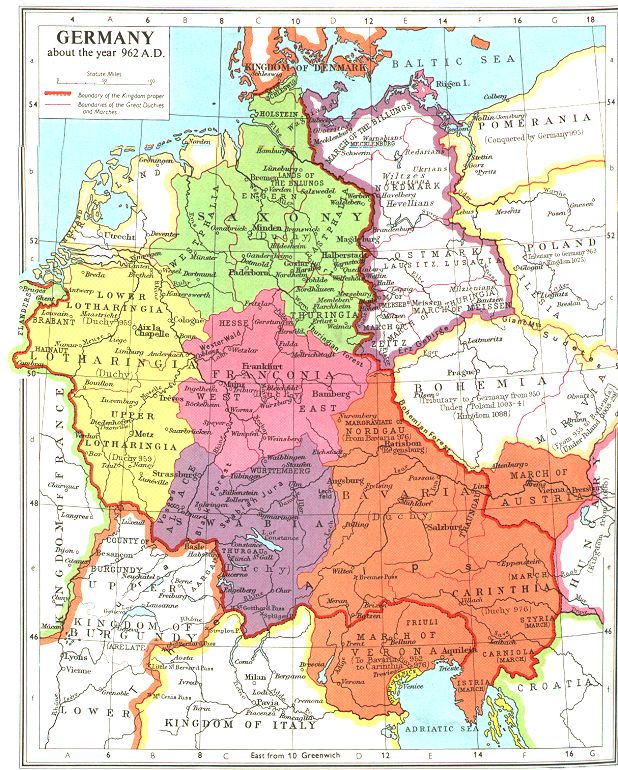I suppose that it might help this forum to have something going on at all times - so, I submit to you what I've been working on as an exercise. A small taste:
HRE NES: The Birth of an Empire
It is the Year of Our Lord 911. Charlemagne, Holy Roman Emperor and King of the Franks, has been dead for nearly a century, and his empire is a shadow of its former self. The Christians of Europe are split into petty kingdoms and duchies, and Charlemagne's crown sits in a Papal vault in Rome - its last wearer, Louis of Burgundy, was humiliated in an abortive invasion of northern Italy, and had his eyes put out by the master of Friuli, Berengar. Berengar has assumed the title of Emperor, though the Pope has yet to officially recognize this, and he is yet uncrowned.
The Throne of Saint Peter is also not what it once was. The current Pope (as was his predecessor, Sergius III) is deep in the sway of several powerful Roman families - more precisely, he is in the sway of powerful women within those families, and the illicit affairs that are rumored to go on in the holiest parts of the Eternal City have become the source of many derisive jokes and ribald rhymes. For now, these powerful families control the Papacy, and use it chiefly for their own immediate gain in the environs of Rome.
Not all is decaying, however. In the dark forests of Germany at the edges of Charlemagne's empire, new powers are emerging. The tribes of the Germanic peoples have only recently restyled themselves as feudal nobility, and have appropriated large and independent realms for themselves. The four most powerful of these German Dukes, rulers of the tribal regions known as the 'Stem Duchies,' have banded together this year and elected the first true King of Germany (or East Franconia, as it is more properly known), Duke Conrad of Franconia. Threatened by the ruthless Magyar horsemen from the southeast, the Dukes have - at least superficially - submitted to a Monarch. Make no mistake, however, that they will humbly accept vassaldom and servile obedience to their new King � it was not long ago that their ancestors were pagan chieftains plundering the ruins of the Roman Empire, and they thirst for the power and wealth that could be theirs as Duke, King - or Emperor.
--------------
What follows is a far-too-long doc that mostly consists of me writing about this NES instead of doing homework. Please enjoy; If we can attract a good 4 players here, I will certainly consider starting the NES for real, but for now I'd just like your comments.
--------------
HRE NES: The Birth of an Empire
It is the Year of Our Lord 911. Charlemagne, Holy Roman Emperor and King of the Franks, has been dead for nearly a century, and his empire is a shadow of its former self. The Christians of Europe are split into petty kingdoms and duchies, and Charlemagne's crown sits in a Papal vault in Rome - its last wearer, Louis of Burgundy, was humiliated in an abortive invasion of northern Italy, and had his eyes put out by the master of Friuli, Berengar. Berengar has assumed the title of Emperor, though the Pope has yet to officially recognize this, and he is yet uncrowned.
The Throne of Saint Peter is also not what it once was. The current Pope (as was his predecessor, Sergius III) is deep in the sway of several powerful Roman families - more precisely, he is in the sway of powerful women within those families, and the illicit affairs that are rumored to go on in the holiest parts of the Eternal City have become the source of many derisive jokes and ribald rhymes. For now, these powerful families control the Papacy, and use it chiefly for their own immediate gain in the environs of Rome.
Not all is decaying, however. In the dark forests of Germany at the edges of Charlemagne's empire, new powers are emerging. The tribes of the Germanic peoples have only recently restyled themselves as feudal nobility, and have appropriated large and independent realms for themselves. The four most powerful of these German Dukes, rulers of the tribal regions known as the 'Stem Duchies,' have banded together this year and elected the first true King of Germany (or East Franconia, as it is more properly known), Duke Conrad of Franconia. Threatened by the ruthless Magyar horsemen from the southeast, the Dukes have - at least superficially - submitted to a Monarch. Make no mistake, however, that they will humbly accept vassaldom and servile obedience to their new King � it was not long ago that their ancestors were pagan chieftains plundering the ruins of the Roman Empire, and they thirst for the power and wealth that could be theirs as Duke, King - or Emperor.
--------------
What follows is a far-too-long doc that mostly consists of me writing about this NES instead of doing homework. Please enjoy; If we can attract a good 4 players here, I will certainly consider starting the NES for real, but for now I'd just like your comments.
--------------






 I pity the fool who gives the last guy any serious duties.
I pity the fool who gives the last guy any serious duties.
Comment